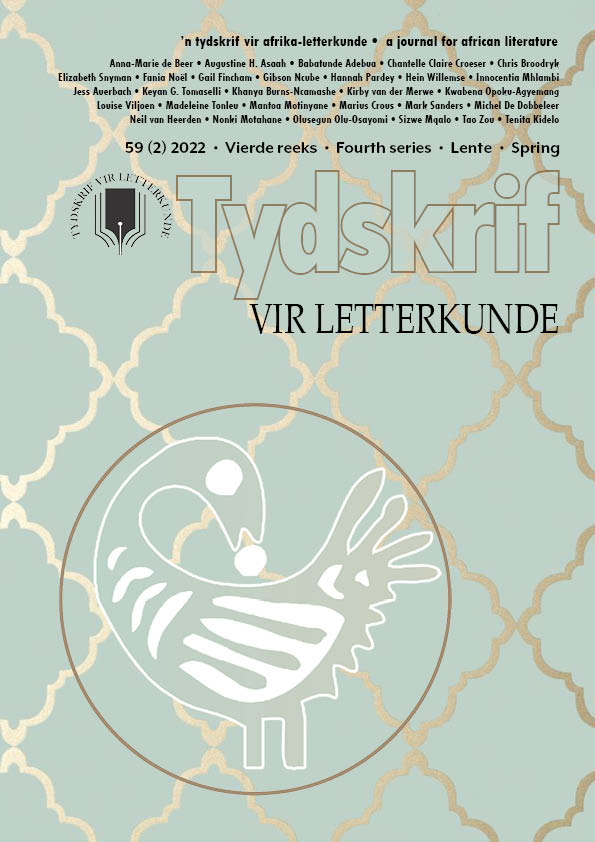Orisa Sanponna: Indigenous health systems, disability, and morality in Osofisan’s dramaturgy
DOI:
https://doi.org/10.17159/tl.v59i2.11931Keywords:
Orisa Sanponna, Yoruba, morality, indigenous health systems, disability, Femi Osofisan, traditional African religion, medicine, leprosyAbstract
The relevance of indigenous literature (by this is meant African literature) as an important resource for the interrogation and understanding of the social construction of the body, illness, or well-being in the African context seems not to be of primary interest to most African researchers in the field of sociology of health. In this article we explore how the notion of Sanponna (the smallpox deity) depicted in Femi Osofisan’s play Esu and the Vagabond Minstrels can be integrated into disability and indigenous health systems in a way that acknowledges both the biological and social facts as well as how this experience can be interrogated within the domain of epistemological, ontological, and moral foundations and concerns. We rely on mythological and analytical approaches as the theoretical underpinning. We begin with a brief explanation of the concept and potential of Sanponna in Yoruba metaphysics. We also look for relationships between moral values and other socio-psychological dimensions and traditional understandings of disability. Thereafter, we briefly examine Orisa Sanponna and its possible impacts on characters and disability in Esu and the Vagabond Minstrels and conclude with an explanation of the relevance of the themes explored by Osofisan in the play to the Nigerian contemporary experience and situation.Downloads
References
Ademeso, Adebola Adebambo. “National Development and the Concept of Compassion in Osofisan’s Esu and the Vagabond Minstrels.” Emerging Perspectives on Femi Osofisan, edited by Tunde Akinyemi & Toyin Falola. Africa World, 2009, pp. 54–63.
Adeniyi, Victoria O. “Religion, Corruption and Democratic Nigeria in Femi Osofisan’s Drama.” Emerging Perspectives on Femi Osofisan, edited by Tunde Akinyemi & Toyin Falola. Africa World, 2009, pp. 151–65.
Adeoti, Gbemisola. “The Trope of the Market in Femi Osofisan’s Dramaturgy.” Emerging Perspectives on Femi Osofisan, edited by Tunde Akintunde & Toyin Falola. Africa World, 2009, pp. 387–408.
Akinyemi, Akintunde. “Deities: The Orisa.” Encyclopedia of the Yoruba, edited by Toyin Falola & Akintunde Akinyemi. Bloomington U P, 2016, pp. 84–5.
Asakitikpi, Alex E. “Engaging in Life’s Dialogue: A Sociological Interpretation of the Notion of Abiku in the Works of Soyinka, Clark and Okri.” Re-Visioning Humanistic Studies, edited by Agwonorobo E. Eruvbetine & Udu Yakubu. African Cultural Institute, 2009, pp. 65–80.
Boston, John S. “The Supernatural Aspects of Disease and the Therapeutics among the Igala.” Studies in Third World Societies vol. 19, no. 2, 1982, pp. 29–42.
Douglas, Mary. Purity and Danger: An Analysis of the Concepts of Pollution and Taboos. Routledge & Kegan Paul, 1966.
Ezeabasili, Nkankwo. “Traditional Ibo ideas about Diseases and Treatment.” Studies in Third World Societies vol. 19, no. 2, 1982, pp. 17–28.
Freund, Peter. The Civilized Body. Temple U P, 1982.
Freund, Peter & Meredith McGuire. Health, Illness and the Body: A Critical Sociology. Prentice Hall, 1991.
Freidson, Eliot L. Profession of Medicine: A Study of the Sociology of Applied Knowledge. Dodd Meal, 1970.
Gabe, Jonathan, Mike Bury & Mary Ann Elston. Key Concepts in Medical Sociology. Sage, 2004.
Goffman, Erving. The Presentation of Self in Everyday Life. Penguin, Routledge & Kegan Paul, 1959.
Idowu, E. Bolaji. Olodumare God in Yoruba Belief. Longmans, 1962.
Johnson-Bashua, Adépéjú. “Healing.” Encyclopedia of the Yoruba, edited by Toyin Falola & Akintunde Akinyemi. Bloomington U P, 2016, pp. 146–7.
Kelly, Michael Paul & David Field. “Medical Sociology, Chronic Illness and the Body.” Sociology of Health and Illness vol. 18, no. 2, 1996, pp. 241¬¬–57.
Lawler, Jocalyn. Behind the Screens: Somology and the Problem of the Body. Churchill Livingston, 1991.
Locker, David. Disability and Disadvantage: The Experience of Chronic Illness. Tavistock, 1983.
Onanuga, Ayobami & Paul Onanuga. “Individualism and the Erosion of African Communality: Exploring Drama for Societal Change in Femi Osofisan’s Plays.” Imbizo vol. 12, no. 1, 2021, pp. 1–20. DOI: https://doi.org/10.25159/2663-6565/7751.
Mathieson, Cynthia M. & Henderikus J. Stam. “Renegotiating Identity: Cancer Narratives”. Sociology of Health & Illness vol. 17, no. 3, 1995, pp. 283–306. DOI: https://doi.org/10.1111/1467-9566.ep10933316.
Osofisan, Femi. Esu and the Vagabond Ministrels. A Fertility Rite for the Modern Stage. New Horn, 1988.
Sesan, Akinwunmi Azeez. “In Search of the Nation: A Reading of Femi Osofisan’s Esu and the Vagabond Minstrels.” Marang: Journal of Language and Literature vol. 31, 2019, pp. 75–87. https://journals.ub.bw/index.php/marang/article/view/1638.
Simpson, George E. Yoruba Religion and Medicine in Ibadan. Ibadan U P, 1994.
Turner, Bryan S. The Body and Society. Blackwell, 1974.
Turner, Bryan S. Regulating Bodies: Essays in Medical Sociology. Routledge, 1992.
Published
Issue
Section
License
Copyright (c) 2022 Tydskrif vir Letterkunde

This work is licensed under a Creative Commons Attribution-ShareAlike 4.0 International License.


 https://orcid.org/0000-0001-6465-6584
https://orcid.org/0000-0001-6465-6584


.png)